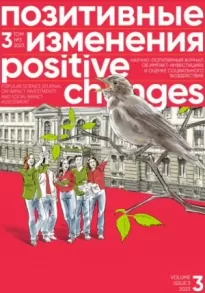Позитивные изменения. Том 3, № 3 (2023). Positive changes. Volume 3, Issue 3 (2023)

- Автор: Редакция журнала «Позитивные изменения»
- Жанр: Научная литература / Газеты и журналы
- Дата выхода: 2023
Читать книгу "Позитивные изменения. Том 3, № 3 (2023). Positive changes. Volume 3, Issue 3 (2023)"
THE PRECURSORS TO CREATING THE COURSE
The decision to spotlight service learning as a distinct facet of university endeavors stems, firstly, from established foreign practices, according to Elena Isaeva, Director of the Center for the Development of the Third Mission at Yaroslavl State University. Secondly, contemporary Russia emphasizes the non-profit sector at the state level. “Hence, omitting the humanitarian component of the non-profit sector from the educational process and excluding representatives of NGOs from higher education — especially when fostering genuine citizenship — is, in my view, misguided,” Isaeva asserts.
A third pivotal factor, as she emphasizes, is the activism of advocates for this technology, who have presented and substantiated its relevance. Notable entities such as Vladimir Potanin Foundation, the Higher School of Economics, the Association of Volunteer Centers, and representatives from resource centers of NGOs in Russia have played a significant role. “In my view, the time has come when the significance of this technology has become evident to the relevant ministry. Timing is crucial,” the expert notes. “It relies on the development of the non-profit sector to an appropriate level and the state’s preparedness to support this direction.”
Dmitry Zemtsov, Vice-Rector of the National Research University Higher School of Economics, believes that service learning practices have existed in Russia for a considerable period of time. However, never before have they been collectively consolidated into a coherent concept. Examples include legal clinics, medical student volunteering, and more. In recent years, experts have increasingly debated the applicability of metaphors like “ivory tower” or “human resources factory” to contemporary universities. Today’s universities are expected not only to address educational and scientific challenges, but also to participate actively and responsibly in social life. In this context, service learning empowers students to translate the acquired knowledge into action, utilizing their professional competencies for societal welfare.
“A consensus has emerged in the global research community that service learning is an effective technology both for nurturing professionals and cultivating civic responsibility and societal concern within students. Thus, today it is not enough for universities to only provide quality education to young people. The modern higher education landscape demands a comprehensive approach that shapes individual identities with a well-defined value system, ethical compass, and moral principles of young professionals,” emphasizes Dmitry Zemtsov.
Presently, higher education is plagued with a structural discrepancy that can be seen from research: a substantial three-quarters of students voice the scarcity of practical application amidst an abundance of theoretical learning in universities, observes Artem Metelev.
“The economy’s momentum outpaces the educational sector’s stride. The methodology of service learning, on the one hand, bridges the gap between reality and academia, interlinking the two realms, and, on the other hand, harnesses students’ vigor and creativity, channeling them towards addressing social dilemmas. What is notable about this practice is that it transcends mere instruction in assisting people; it cultivates students’ professional competencies with a focus on tackling specific societal challenges — the very issues that will define their journey forward, cementing their role as sought-after professionals and engaged citizens,” asserts the expert.





